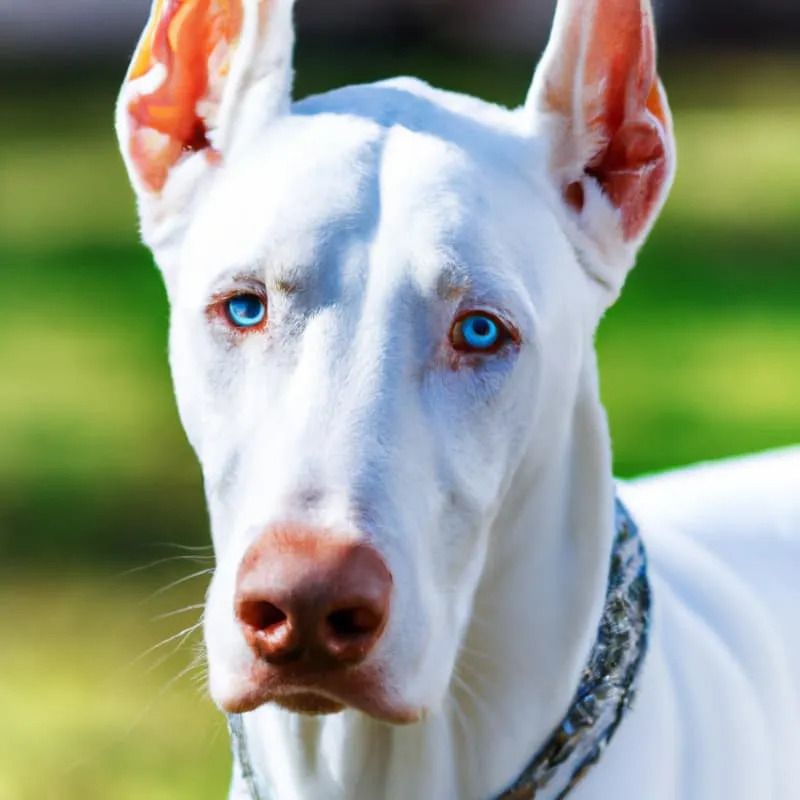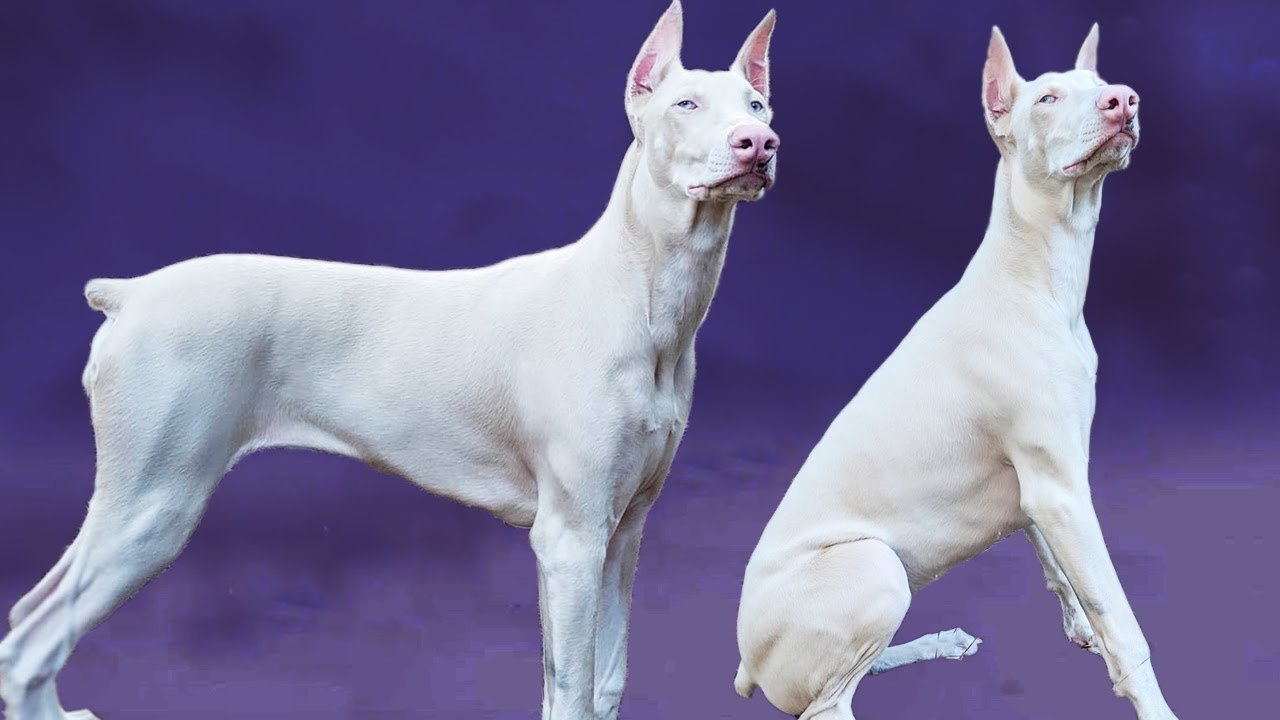When it comes to Dobermans, one color variation that often captures people’s attention is the white Doberman. However, many wonder if such a dog truly exists. Well, the answer is yes, there are white Dobermans! Although rare, these beautiful creatures do exist, and they have their own unique characteristics that set them apart from the more common black and tan Dobermans.
The white Doberman is a result of a genetic mutation known as the “albino gene.” This gene affects the pigmentation of the dog’s coat, resulting in a pale, almost cream-colored fur. It’s important to note that true white Dobermans may also have health issues associated with albinism, such as vision problems or an increased risk of sunburn. Despite their rarity and potential health concerns, many people find white Dobermans to be stunning and are drawn to their unique appearance.
Yes, there is a white Doberman! While the most common color for Dobermans is black and tan, white Dobermans do exist. They are the result of a genetic mutation that affects the pigmentation of their coat. However, it’s important to note that white Dobermans are considered “albino” and may have certain health concerns, such as vision and hearing issues. If you’re considering getting a white Doberman, make sure to do thorough research and consult a reputable breeder.

Is There a White Doberman?
Dobermans are known for their sleek black and tan coats, but is it possible to find a white Doberman? In this article, we will explore this question and provide you with detailed information about the existence of white Dobermans.
The Genetics of Doberman Coat Colors
The coat color of Dobermans is determined by genetics, specifically the interaction between two genes: the black gene (B) and the dilution gene (D). The black gene is responsible for producing the black coat color, while the dilution gene can modify it to create different shades.
The most common coat color for Dobermans is the black and tan pattern, which is the result of having two copies of the black gene (BB) along with the absence of the dilution gene (dd). This combination produces the characteristic black coat with tan markings on the chest, face, and legs.
Understanding White Dobermans
White Dobermans, also known as “albino Dobermans,” have a genetic variation that prevents the production of pigment in the hair, skin, and eyes. This variation is caused by a mutation in the SLC45A2 gene, which is involved in the production and distribution of melanin, the pigment responsible for coloration.
As a result of this mutation, white Dobermans have a white or cream-colored coat, pinkish skin, and light-colored or blue eyes. However, it’s important to note that not all dogs with a white coat are true albino Dobermans. Some may have a lighter coat due to other genetic factors but still retain pigment in their skin and eyes.
Controversies and Health Issues
The existence of white Dobermans has been a subject of controversy in the dog breeding community. Traditional breeding standards do not recognize white as an acceptable coat color for Dobermans, leading to debates about the ethics of breeding for this color variation.
Furthermore, white Dobermans are more prone to certain health issues, such as vision problems, sunburn, and skin cancer. The lack of pigment in their eyes and skin makes them more susceptible to damage from the sun’s ultraviolet rays. As a result, white Dobermans require extra care and protection to ensure their well-being.
The Role of Responsible Breeding
Responsible breeders prioritize the overall health and well-being of Dobermans over specific coat colors. They aim to produce puppies with sound temperaments, good health, and adherence to breed standards. It is important to research and choose a reputable breeder who prioritizes the health and genetic diversity of the breed.
Adoption and Rescue Options
If you’re interested in owning a Doberman, consider adoption or rescue options. Many organizations and shelters have Dobermans and Doberman mixes available for adoption. By adopting, you can provide a loving home to a dog in need while bypassing the controversies surrounding coat colors.
Educating and Informing Others
To contribute to the well-being of Dobermans and the understanding of coat colors, it’s important to educate and inform others about the complexities of breeding and the potential health issues associated with certain coat variations. By spreading awareness, we can ensure the betterment of the breed as a whole.
Conclusion
While white Dobermans do exist, their presence is controversial, and they require special care due to their increased susceptibility to health issues. Responsible breeding and adoption are crucial in upholding the well-being and standards of the Doberman breed. By understanding the genetics and complexities behind coat colors, we can make informed decisions and create a positive impact on the dog breeding community.
This is what you need to know about white Dobermans:
- White Dobermans are a rare color variation of the Doberman Pinscher breed.
- Their coat color is caused by a genetic mutation known as albinism.
- White Dobermans have a higher risk of health issues, including deafness and vision problems.
- Some kennel clubs do not recognize white Dobermans as a standard color for the breed.
- If you are considering getting a white Doberman, make sure to find a reputable breeder who prioritizes the health and well-being of their dogs.
Frequently Asked Questions
In this section, you will find answers to some commonly asked questions about the existence of white Dobermans.
1. Are there white Dobermans?
Yes, there are white Dobermans. While the traditional Doberman Pinscher is known for its sleek black or dark brown coat with rust-colored markings, a white Doberman can also occur due to a genetic mutation. These white Dobermans, often referred to as “white Dobermans” or “white Dobermans with albino genes,” have a coat that is predominantly white, with slight variations in eye color ranging from blue, gray, or amber.
It is important to note that white Dobermans do not conform to the breed standard recognized by official kennel clubs. Due to potential health issues associated with the albino genes, responsible breeders generally do not intentionally breed for white-coated Dobermans. While they can make wonderful companions, prospective owners should be aware of the unique care needs and potential health concerns that come with owning a white Doberman.
2. What causes the white coat color in Dobermans?
The white coat color in Dobermans is a result of a genetic mutation that affects the production of pigmentation. This mutation is known as the “albino gene.” It inhibits the production of melanin, the pigment responsible for the dark coloration in the coat, eyes, and skin. As a result, Dobermans with this mutation have a predominantly white coat and lighter eye color compared to the standard colors seen in the breed.
It is important to understand that white Dobermans with this genetic mutation may be more prone to certain health issues, such as sunburn, skin sensitivity, and vision problems. Therefore, it is crucial to provide them with adequate protection from harsh sunlight and seek regular veterinary care to address any potential health concerns.
3. Can white Dobermans participate in dog shows or competitions?
No, white Dobermans are not eligible to participate in official dog shows or competitions. This is because the breed standard for Dobermans does not recognize the white coat color as acceptable. Official kennel clubs, such as the American Kennel Club (AKC) and the Fédération Cynologique Internationale (FCI), only recognize the traditional colors for Dobermans, which are black or dark brown with rust-colored markings.
However, white Dobermans can still excel in other areas such as obedience trials, agility, and as loving family pets. Their unique appearance and temperament can make them stand out, even though they may not be eligible for official show competitions.
4. Are white Dobermans more prone to health issues?
White Dobermans may be more prone to certain health issues compared to their traditionally colored counterparts. The albino gene that causes their white coat can also impact their overall health. Some common health concerns in white Dobermans include sunburn, skin sensitivity, vision problems, and a higher risk of developing certain types of cancer.
To ensure the well-being of a white Doberman, it is essential to provide proper care, including regular veterinary check-ups, protection from excessive sunlight, and a balanced diet. Early detection and proactive management of any potential health issues can help white Dobermans live happy and fulfilling lives.
5. Are there any organizations or rescue groups dedicated to white Dobermans?
Yes, there are organizations and rescue groups specifically dedicated to the well-being and welfare of white Dobermans. These groups aim to provide education, support, and resources for owners of white Dobermans, as well as facilitate adoption and rehoming of white Dobermans in need.
If you are considering adopting a white Doberman, it is recommended to reach out to these organizations or rescue groups for guidance and information. They can provide valuable insights on the unique needs and considerations of owning a white Doberman, as well as connect you with potential adoptable dogs.

In conclusion, yes, there is such a thing as a white Doberman. While white Dobermans are rare and considered a result of albinism, they still exist.
However, it’s important to note that white Dobermans may have health issues due to their unique pigmentation. Despite their rarity, white Dobermans can make loving and loyal pets with proper care and attention.
